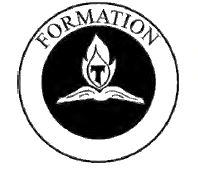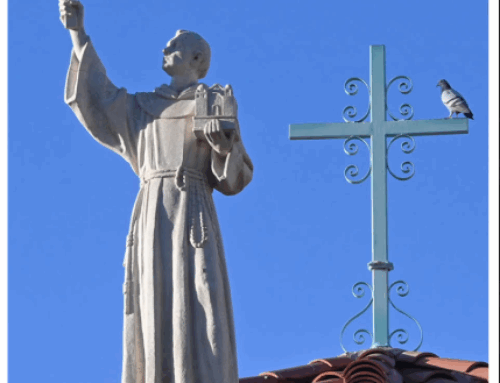(This article originally appeared in the Spring/Summer TAU-USA Issue #103)
Formation Commission
Francis of Assisi: Saint and Writer
Justin Carisio, OFS
National Formation Commission
 Thomas of Celano tells us that two years before St. Francis’s death:
Thomas of Celano tells us that two years before St. Francis’s death:
While the saint was secluded in a cell on Mount La Verna, one of his companions was yearning with great desire to have something encouraging from the words of our Lord, commented on briefly by Saint Francis and written with his own hand.… One day Saint Francis called this brother and said: “Bring me paper and ink, because I want to write down the words of the Lord and his praises upon which I have meditated in my heart.” What he had asked for was quickly brought to him. He then wrote down with his own hand the Praises of God and the words he wanted and, at the end, a blessing for that brother, saying: “Take this paper for yourself and keep it carefully to your dying day.”[1]
That small parchment from 1224 is now in the Basilica of St. Francis in Assisi. Francis wrote “The Praises of God” on one side and “A Blessing for Brother Leo” on the other. It is one of only two surviving documents actually written in Francis’s own hand. The other is “A Letter to Brother Leo” preserved in the Cathedral of Spoleto. They are among the 30 or so writings composed by Francis. They range from prayers and letters to longer documents. They include Francis’s great poem, The Canticle of the Creatures, the value of which extends beyond the Franciscan family and which has an important place in the canon of Italian literature.
The number of Francis’s writings may, at first glance, appear limited. However, consider the era in which he lived, the radical poverty of the life he chose, and the uncertain conditions under which anything he wrote would have been preserved. It quickly becomes apparent that we are blessed to have as much as we do in the voice of our founder. By comparison, only four writings by Francis’s contemporary, St. Dominic, who founded the Order of Preachers, survive.[2]
Regis Armstrong, OFM Cap., suggests that Francis’s writings reflect his deep humility, his “determination to hide the gifts the Lord has bestowed on him.”[3] Even so the gifts of a writer’s temperament and a poet’s impulse invariably shine through. Francis had a natural inclination to use words to communicate his beliefs, to record his thoughts, to create beauty, and to offer praise. Murray Bodo, OFM writes, “Although St. Francis’s whole being was that of a poet, he was not a poet in the modern sense of someone whose vocation or avocation is the writing of poetry.” Rather, “he walked and praised as a poet would as he followed Jesus.”[4]
Familiarity with Francis’s writings should be part of the initial and ongoing formation of every Secular Franciscan, especially considering that one of his writings, The Earlier Exhortation, forms the “Prologue” to the Secular Franciscan Rule. His writings let the saint speak for himself. They permit us to encounter him on his own terms.
What are some ways to enhance this encounter?
First, fundamental to understanding Francis as a writer is to understand that Scripture always informs his documents. His writings are replete with quotations from the Gospels and Psalms as well as other scriptural references and allusions.[5] Our encounter with Francis’s writings is a reminder that even for us, Scripture comes before the documents. Knowing and following Jesus and what the gospel life entails is our life’s work just as it was Francis’s.
Another consideration to keep in mind is that biographies over the centuries, as well as film and video over the past hundred years or so, have filled our imaginations with convincing representations of Francis’s life and times. It becomes difficult to see through these cultural, religious, and media filters and confront Francis as he was: a medieval, urban, Italian man.[6] The time in which we live separates us in profound ways from the world in which Francis’s ideas and experiences were shaped, defined, and expressed. The Francis we meet in his writings is fascinating, ardent, and devout, but also frank, determined, and assertive. The places where he lived and travelled appear intriguing and exotic, but also remote and dangerous. The reader of Francis’s writings who takes time to learn about late 12th and early 13th century history or to study the art and objects from that era will find it time well-spent.
Also, for most of us, our encounter with what Francis wrote will be through translations. All but two of his writings were in Latin. (The Canticle of the Creatures and The Canticle of Exhortation for the Ladies of San Damiano were written in his Umbrian dialect of Italian.[7]) Fortunately for English readers, there are outstanding modern translations in printed book form (Francis of Assisi, Early Documents, vol 1, New City Press) or on the web at the Commission on the Franciscan Intellectual- Spiritual Tradition (CFIT).[8] We may not hear Francis’s voice in the most immediate way, but the translators’ scholarship and skill help to reveal for us the saint’s spirit and personality. These translations are also accompanied by valuable introductions and footnotes that aid in opening up the documents by providing context and explanations.
Finally, although Francis was not a writer by profession or avocation, he was yet a serious writer. He considered what he wrote to be important. He insisted when his words were being copied for sharing with others that they be reproduced exactly as he had written—nothing added or subtracted.[9] Thaddée Matura, OFM, underscores this: “He was able and loved to write or have others write for him. He insisted on the preservation of what he wrote…. He was convinced of the power of the Word of God, which he had received in faith and to which he had oriented his life. The necessity of transmitting this belief into writing for everyone of every generation was a mission for him.”[10] We are the most recent generation to receive what Francis wrote. Let us take the time to read, measure, and heed his words.
[1] The Remembrance of the Desire of a Soul by Thomas of Celano, in Francis of Assisi: Early Documents, vol 2, The Founder, ed. Regis J. Armstrong, OFM Cap, J. A. Wayne Hellman, OFM Conv., and William J. Short, OFM (Hyde Park, N.Y.: New City Press, 2000), 282.
[2] “Dominican Documents: Letters of St. Dominic,” www.domcentral.org/trad/domdocs/0002.htm, accessed May 3, 2021
[3] Regis J. Armstrong, OFM Cap., St. Francis of Assisi Writings for a Gospel Life, (New York: Crossroad Publishing Company, 1994), 25
[4] Murray Bodo, OFM, Poetry as Prayer St. Francis of Assisi, (Boston: Pauline Books and Media, 2003), 56.
[5] Thaddée Matura, OFM. Francis Of Assisi The Message in His Writings (St. Bonaventure, N.Y.: Franciscan Institute Publications, 1996, 2004), 16
[6] Augustine Thompson, O.P., Francis of Assisi, A New Biography, (Ithaca and London: Cornell University Press, 2012), 3
[7] Matura, 9.
[8] See: https://franciscantradition.org/early-sources
[9] Regis J. Armstrong, OFM Cap. and Ignatius C. Brady, OFM, Francis and Clare The Complete Works (New York: Paulist Press, 1982), 7.
[10] Thaddée Matura, OFM. Francis Of Assisi Writer and Spiritual Master (Cincinnati: Franciscan Media, 2005), 1


Leave A Comment